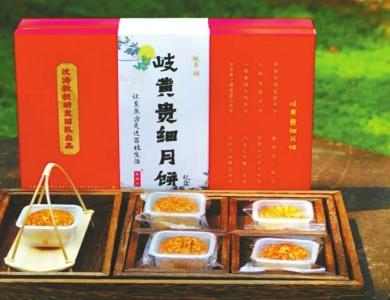Food with TCM ingredients gains in popularity
Traditional Chinese medicine (TCM) teas, TCM coffee, TCM bread, TCM ice cream, and even TCM mooncakes...recently, TCM has stepped out of pharmacies and sparked a wave in the food and beverage industry with the concept that "TCM can pair with anything". Not only do businesses see the potential of TCM, but TCM hospitals across the country have also joined in, launching many hit products.
To celebrate Mid-Autumn Festival, universities and hospitals of TCM across China have rolled out mooncakes with traditional medicinal materials.
Chengdu University of Traditional Chinese Medicine, based in Chengdu, capital of southwest China's Sichuan Province, has launched a type of mooncake with ingredients that are both edible and have medicinal value, such as bird's nest, donkey-hide gelatin, ginseng, dendrobium, Solomon's seal, lily, and poria cocos.

Photo shows innovative mooncakes launched by Chengdu University of Traditional Chinese Medicine (TCM), based in Chengdu, capital of southwest China's Sichuan Province. The mooncakes contain ingredients that are both food and TCM materials, such as bird's nest, donkey-hide gelatin, ginseng, dendrobium, Solomon's seal, lily, and poria cocos. (Photo/WeChat account of Chengdu University of Traditional Chinese Medicine)
Over 50,000 of the mooncakes, which have eight flavors, were sold in less than a month since its debut.
Many TCM universities and hospitals across China, including some in Beijing, east China's Jiangsu and Zhejiang provinces, as well as north China's Hebei Province, have also launched mooncakes with TCM ingredients.
Previously, a wide variety of TCM-related innovations from the food and beverage industry, including TCM tea beverages, TCM coffee, TCM bread, and even TCM ice creams, have been welcomed by consumers across the country.
In particular, TCM tea beverages have enjoyed great popularity among consumers.
In May this year, Zhejiang Provincial Hospital of Traditional Chinese Medicine unveiled a dark plum soup named "dark plum lotus leaf drink". It has become an instant hit, setting a sales record of over 1.15 million servings within 24 hours of its launch, with a peak of over 10 million servings in a single day.
Known for its ability to engender liquid and allay thirst, as well as to promote digestion and stimulate appetite, dark plum soup is based on an ancient formula from a medical book by a famous doctor from the Ming Dynasty (1368-1644).
Considering that people's living environment and dietary habits in modern times are different from that of ancient people, the research team led by Xia Yongliang, chief TCM physician at the Zhejiang Provincial Hospital of Traditional Chinese Medicine, made more than 30 adjustments to the formula in terms of efficacy and taste.
The "dark plum lotus leaf drink", dubbed "dark plum soup 2.0", now retains the original ingredients of dark plum, licorice, and hawthorn fruits, while adding lotus leaves and Salvia miltiorrhiza, as well as other TCM ingredients.
A TCM hospital in Jiading district, east China's Shanghai, developed a formula of dark plum soup with tangerine peel, rose petals, and mint, which boasts a sweet and floral taste with a hint of refreshing mint aroma.
In fact, many ingredients in people's daily diet are both medicine and food - this is the TCM concept of medicine and food homology.
China's food security law stipulates that no medicine may be added to any produced or distributed food, unless the added substance is traditionally considered as both food and a TCM ingredient.
The catalog of the substances traditionally considered as both food and TCM ingredients shall be developed and published by the administrative department of health under the country's State Council in collaboration with food safety supervision and management administration under the State Council, according to the law.
Currently, there are a total of 106 substances in the catalog issued by China.
Medical experts recommend that consumers should first understand their body constitution before attempting to improve their health by leveraging the concept of medicine and food homology.
For example, in ancient times, pork lard was considered a TCM ingredient due to its high calorie content and fat-soluble vitamins that aid in nutrient absorption. However, in modern society where resources are abundant, excessive consumption of pork lard can lead to elevated blood lipid levels and increase the risk of atherosclerosis.
While these edible TCM ingredients all can offer health benefits, it is important that consumers consume them based on their own health needs. Individuals should follow science-based methods for health preservation that are tailored to their specific constitution, as consuming innovative TCM beverages and foods that are not suitable for their constitution may cause the opposite effect, according to TCM experts.
Photos
Related Stories
- My journey into traditional Chinese medicine
- Chinese medicine teams to provide treatment to retired Maltese footballers
- China to enhance TCM's role in providing healthcare services: official
- Feature: Bittersweet elixir: Traditional Chinese medicine meets modern milk tea
- Feature: Therapeutic TCM flourishes in Germany with growing recognition
- Trending in China | Donkey-hide gelatin
Copyright © 2024 People's Daily Online. All Rights Reserved.









